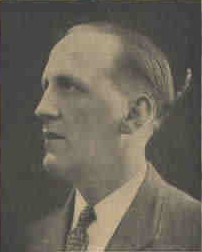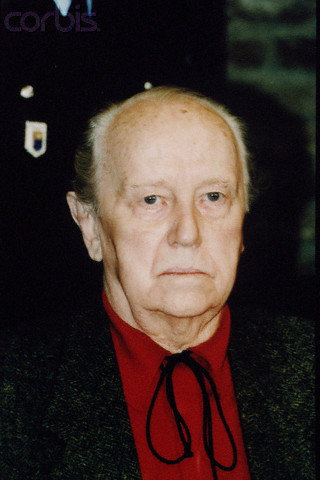<Back to Index>
- Head of the Parti Populaire Français in Marseille Simon Pierre Sabiani, 1888
- Head of Intelligence in Chambéry Milice Paul Touvier, 1915
PAGE SPONSOR

Simon Pierre Sabiani (1888 Casamaccioli, Niolu, Corsica - 1956 Barcelona, Spain) was a WWI hero, businessman, and politician.
He served in WWI "La grande guerre" (The great war), incorporated into the XVth corps of the 112th regiment of line infantry, he lost an eye in Douaumont, several times wounded, he directed against the enemy six counterattacks in six hours. Nicknamed "Le lion de l'Argonne" (the lion of Argonne), "Le Bayard Corse" (The Corsican Bayard), he was given on the battlefield, "La legion d'honneur" medal, "La croix de guerre" 1914 - 1918 4 palms 2 silver stars, and "La medaille militaire".
He had four Brothers, and one sister. Three of his brothers fell in combat in WWI.
Jean - Luc was a lieutenant. He was given "La Legion d'honneur" and "La Croix de guerre", KIA while in an attack in Champagne.
Joseph was a sergeant major in the 4th regiment of "zouaves", KIA in Provins in 1914.
François was a Lawyer in Marseille, sergeant, he was given "La Croix de guerre", KIA the 16th of August 1918 onboard "Le Balkan" ship as it suffered a torpido attack. Pierre Anfriani the only survivor of the general staff, would note in his report to the Sea Authorities that, François Sabiani could have saved himself if he did not try to save other passengers. A marble plate in his honor used to be affixed on the walls of the hall of justice of the city of Marseille.
Don - Pierre became a POW, after being wounded in the head while on a mission in Bois - le - Prêtre, his helmet saved his life. (Fifty two months of captivity).
After the war, Simon Sabiani joined the SFIO in 1919, and also for a while the PCF. He then founded in 1923 the "Parti d’action socialiste" (Socialist action party).
He was elected "Conseiller général" (General counselor) of Bouches - du - Rhône in 1925, "Député" (Deputy) in 1928, and became the first "Adjoint" (Counselor) to the mayor of Marseille from 1929 to 1935. He became the mayor of Marseille temporarily in 1931 after the death of Siméon Flaissières. He was reelected "Député" (Deputy) in 1932.
In 1936 he joined the "Parti populaire français" (Popular French party) or PPF of Jaques Doriot, where he became member of the political bureau. He was at the head of the local section of the PPF from 1936. Among his friends and electoral agents were Paul Carbone, François Spirito, and as well as Antoine Guerini.
During the Second World War, he ran the Marseille Bureau of the LVF, where he was the general secretary.
Simon Sabiani was sentenced to death, because of his political Collaboration with Vichy France. He exiled himself to Sigmaringen, Germany, Italy, Argentina and, finally, to Spain under the name of Pedro Multedo. Prior to his death in 1956, he could return in a "clandestine" way to Corsica to visit his mother who was turning almost 100 years old. He rests now in the family chapel of his village of Casamacciuli.
His son François Sabiani, law student aged 20, joined the LVF. He wanted to join the Forces Françaises Libres (French Free Forces), and was already onboard a ship in Port - Vendre, where his father obliged him to disembark. In his book "Et J'ai Cassé Mon Fusil" (And I broke my shotgun), Jean - Baptiste Emmanuelli writes that he joined the LVF, to the demand of the mother of François Sabiani, with the mission being to try and convince her son of quitting the LVF. The army wrote in their reports: « He had a high conception of his duty. He distinguished himself the 29th of May 1942, on a reconnaissance patrol by his calm and his lack of fear for danger. He was Fatally wounded the 2th of Juin 1942, accomplishing a mission». His Life was taken away by bullets fired from "Maxim" machine guns by Soviet partisans under the command of Colonel Gradov, in the eastern front, not far from Smolensk, Russia, while on an LVF mission, in the beginning of June 1942. He perished with plain lucidity. His last words were for his family.

Paul Touvier (April 3, 1915 - July 17, 1996) was a French Nazi collaborator during World War II in Occupied France. In 1994, he was the first Frenchman to be convicted of crimes against humanity for his actions in Vichy France.
Paul Touvier was born in Saint - Vincent - sur - Jabron, Alpes de Haute - Provence, in southeastern France. His family was devoutly Roman Catholic, lower middle class and extremely conservative. He was one of 11 children, and the oldest of the five boys. Serving as an altar boy when young, he attended a seminary for a year, intending to become a priest.
Touvier's mother, Eugenie, was an orphan who was raised by nuns. As an adult, she was very religious and went to Mass every day. She died when Touvier was an adolescent. His father, François Touvier, was a tax collector in Chambéry, after having retired after 19 years as a career soldier. Touvier's father was very conservative, an admirer of the monarchist and anti - parliamentarist Charles Maurras and L'Action Française.
Paul Touvier graduated from the Institute St. Francis de Sales in Chambéry at the age of 16. When he turned 21, his father got him a job as a clerk at the local railroad station, where he continued to work as World War II began. Widowed on the eve of the war, he continued to reside in Chambéry. Touvier was mobilized for the war effort in 1939. After the Vichy government was created, Touvier and his family were firm supporters of Maréchal Petain. They both joined the Vichy veterans' group when it was founded in 1941.
Joining the French Army's 8th Infantry Division, Touvier fought the German Wehrmacht until, following the bombing of Chateau - Thierry, he deserted. Touvier returned in 1940 to Chambéry, which was then occupied by the Kingdom of Italy. His life took a new course after the Milice was established.
Touvier had become known for chasing girls and for trading in the black market. Disgusted, his devoutly Catholic father persuaded him to join the Milice, hoping that a little military discipline would "make a man out of" his son.
Touvier was eventually appointed head of the intelligence department
in the Chambéry Milice under the direction of the German SS official,
Klaus Barbie. In January 1944 he became second regional head.
After the liberation of France by the Allied forces, Touvier went
into hiding; he escaped the summary execution suffered by many suspected
collaborators. On September 10, 1946, the government sentenced him to death in absentia for treason and collusion with the Nazis. In 1947, he was arrested for armed robbery in Paris, but escaped.
By 1966, implementation of his death sentence was barred based on a 20 year statute of limitations. Following this, attorneys for Touvier filed an application for a pardon. They requested that the lifetime ban on leaving the country and the confiscation of goods linked to the death penalty be lifted. In 1971, French President Georges Pompidou granted Touvier the pardon.
Pompidou's pardon caused a public outcry. This increased when it was revealed that most of the property Touvier claimed as his own had allegedly been seized from deported Jews.
On July 3, 1973, Georges Glaeser filed a complaint against Touvier in
the Lyon
Court, charging him with crimes against humanity. There was no statute
of limitations for such charges. Glaeser accused Touvier of ordering the
execution of seven Jewish hostages at Rillieux - la - Pape near Lyon,
on 29 June 1944. This was in retaliation for the murder the previous
evening of Philippe Henriot,
the Vichy Government's Secretary of State for Information and
Propaganda. After being indicted, Touvier disappeared again. Years of
legal maneuvering ensued through his lawyers until a warrant was issued
for his arrest on November 27, 1981.
On May 24, 1989, Touvier was arrested at the Society of Saint Pius X (SSPX) Priory in Nice. The SSPX said at the time that Touvier had been allowed to live in the Priory as "an act of charity to a homeless man." After his arrest, newspapers reported that Touvier had been aided for years by the Catholic Church hierarchy in Lyon and later by members of the Traditionalist Catholic movement. He was defended by the monarchist lawyer Jacques Tremollet de Villers, who later became president of the Traditionalist Catholic organization, La Cité Catholique.
In addition to the charges for the murders at Rillieux - la - Pape, Touvier was alleged to have played an important part in the execution of Victor Basch, a prominent human rights leader, and his wife. He was also accused of having directed the deportations of other Jews. During the two years following Touvier's arrest, French media reported 20 additional allegations.
Paul Touvier was granted provisional release in July 1991. His
trial for complicity in crimes against humanity did not begin until
March 17, 1994. He expressed remorse
for his actions, saying that he thought of the seven Jewish victims of
Rillieux - la - Pape every day. A Traditionalist Catholic priest of the Society of Saint Pius X
sat beside him at the defense table, acting as his spiritual adviser.
On April 20, a nine person jury found him guilty and Touvier was
sentenced to life imprisonment. An appeal was rejected in 1995 by the Court.
On July 17, 1996, Paul Touvier died at age 81 of prostate cancer in Fresnes prison, near Paris. A Tridentine Requiem Mass was offered for the repose of his soul by Father Philippe Laguérie at St Nicolas du Chardonnet, the Society of St. Pius X chapel, in Paris.
The Irish - Canadian novelist Brian Moore's 1995 novel, The Statement, is loosely based on Touvier's life. It was adapted as a film, also titled The Statement (2003), directed by Norman Jewison. Michael Caine appeared as Pierre Brossard, a character inspired by Touvier.
The 1989 efforts by French authorities to find and arrest Touvier are documented in an episode of the History Television series, Nazi Hunters, first broadcast November 1, 2010.
For several years, the Belgian singer Jacques Brel worked with Touvier. Touvier met Brel by reportedly approaching him in a restaurant and saying, "I am Paul Touvier, a condemned man." Brel's wife, however, said that they knew him only as "Paul Berthet", an alias he sometimes used, based on his wife's maiden name.